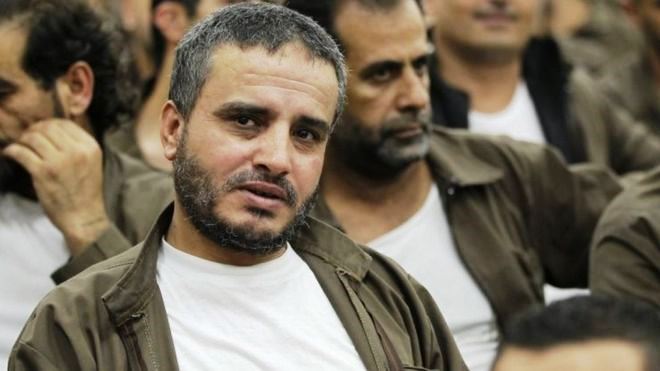
JERUSALEM – It was a scene most Israelis will never forget: Jordan’s King Hussein, who just about two years earlier had signed a historic peace deal with Israel, arrived in a peripheral Israeli town to comfort the parents of seven schoolgirls killed by one of his soldiers.
Kneeling on the floor beside the grieving family of 13-year-old Adi Malka, the king said, “I feel like I have lost a child, too.” He asked them and the six other sets of parents he visited for forgiveness and promised he would seek justice.
In the years since, Hussein, then-Israeli Prime Minister Yitzhak Rabin and the other leaders who signed the Israeli-Jordanian peace pact have passed on, and the warm, hopeful ties have given way to a cold peace. And Saturday night, Ahmed Daqamseh, the Jordanian soldier responsible for the 1997 killing of the Israeli schoolgirls, was released from jail.
He had served 20 years.
“We knew he would be released sometime soon, but it still hurts,” Hila Levy, who was injured in the attack on March 13, 1997, told Israel Army Radio on Sunday. She had been with her classmates on a field trip at the border site known as Naharayim – the “Island of Peace” – when they were attacked.
“I really admired the king for coming here, but he promised that this man would get the punishment he deserved,” said Levy, now 33. “A man like that does not deserve to be free.”
In Jordan, supporters of Daqamseh, whom the Jordan military court deemed mentally unstable at the time, hailed his release and called him a hero.
He was released overnight Saturday, Jordanian authorities said, to forestall large celebrations and a hero’s welcome. But hundreds of relatives and supporters greeted Daqamseh at his family home in the northern village of Ibdar, 60 miles north of Amman, the Jordanian capital.
In his first statement after leaving prison, Daqamseh said, “I entered prison a soldier of the armed forces and today I consider myself a member of the armed forces.”
“Don’t believe the lie of normalization with the Zionist entity. Don’t believe the lie of the two-state solution; Palestine united is from the ocean to the river … there is no state called ‘Israel,'” he later said in an interview with Al Jazeera.
Daqamseh’s name trended on Twitter, and social media users hailed the former soldier as a “hero” and a “model.” Jordanians explained their support by pointing to lenient or nonexistent punishments handed down to Israeli citizens and soldiers convicted of killing Palestinian civilians.
“Israelis kill Palestinians by the hundreds every month, and no one is brought to justice. Why do we punish a soldier?” asked Mohammed Youssef, a 45-year-old shopkeeper in central Amman, watching recaps of Daqamseh’s release on television.
“It is not logic. It is feeling – a sense of revenge, a kind of compensation, a way of dealing with Israelis the same way they deal with Palestinians – killing them outside the law without being punished,” said Oraib al-Rantawi, director of the Amman-based Al Quds Center for Political Studies.
“It is not shocking to see Jordanians supporting this guy, despite the fact what he did is not something you could feel honorable about,” Rantawi said.
Over the years, Daqamseh has been adopted by the opposition movement, led by Islamists and nationalists. During the Arab Spring protests in Jordan in 2011 and 2012, calls for his release were common.
“We expected Daqamseh to be released after the murder of Mohammed Abu Khdeir. We expected him to be released after the killing of Judge Raed al-Zaytar. We expected him to be released after each Israeli violation of human rights,” said Naim Khasawneh, a spokesman for the Islamic Action Front, the Muslim Brotherhood’s political party in Jordan.
King Abdullah II, Hussein’s son, and his appointed governments consistently refused to consider the requests for Daqamseh’s release or even discuss them.
Daqamseh’s appeal is also partly because of his background. He belongs to an East Bank tribe, the backbone of the Jordanian regime, and is a member of the army – the most popular institution in the country. His supporters believe he opened fire in “the line of duty” and was “provoked” because he was mocked while he was praying.
In Israel, Daqamseh’s release is painful. Many see the shooting in Naharayim as a landmark event that marred the peace with Jordan before real relations had a chance to take root. In the 20 years since, the two countries continue to uphold the treaty, with military and some economic cooperation, but there is little interaction between the citizens of each state.
(c) 2017, The Washington Post · Ruth Eglash, Taylor Luck

